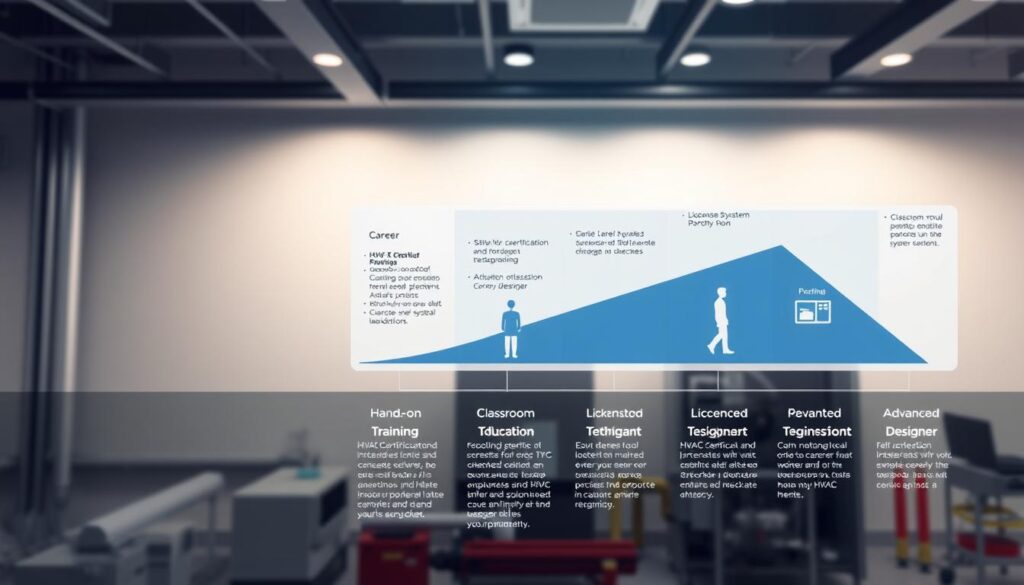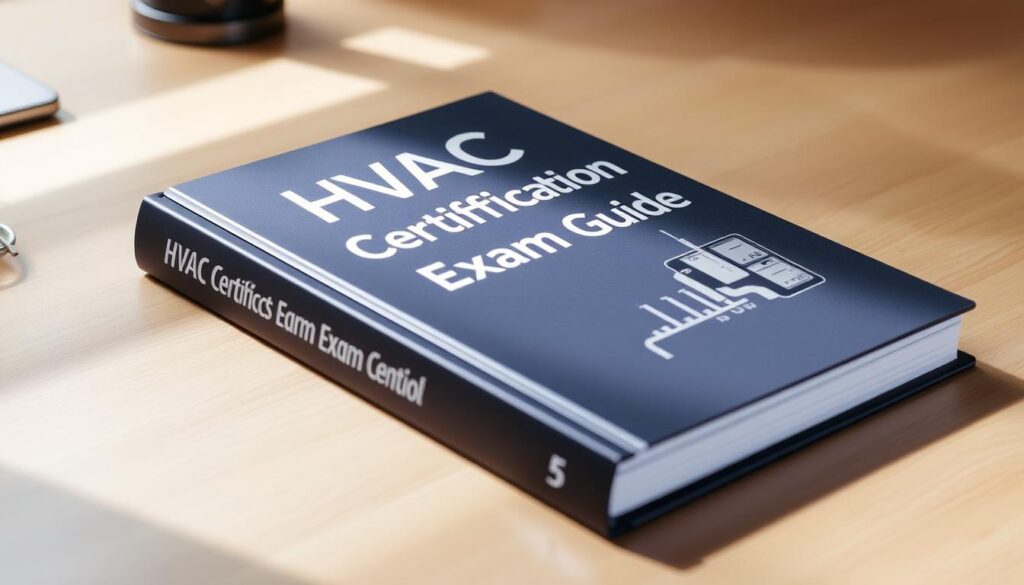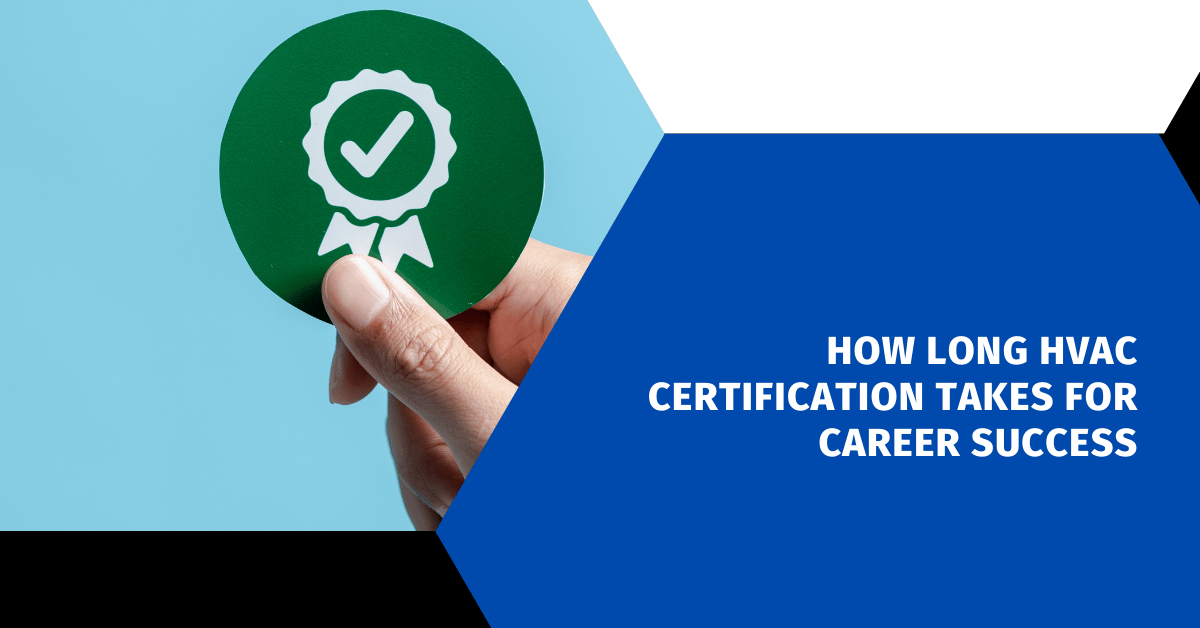How Long HVAC Certification Takes for Career Success? Are you ready to start a rewarding career that keeps America’s homes and businesses comfy? HVAC certification is a great way to achieve success. But, how long does it take to become a certified technician?

HVAC certification shows you’re skilled in heating, ventilation, air conditioning, and refrigeration. The U.S. Bureau of Labor predicts a 9% growth in HVAC/R technician jobs. This makes now a great time to learn how HVAC certification can boost your career.
How long it takes to become a certified HVAC technician varies. Some programs last just six months, while others can take up to two years. Your choice depends on your career goals, how you learn, and your personal schedule.
Key Takeaways
- HVAC certification programs range from 6 to 24 months
- Multiple career paths are available in the HVAC industry
- Certification increases job marketability and earning power
- Training includes hands-on experience with industry-standard tools
- Financial aid and VA benefits can support your education
Table of Contents
Understanding the HVAC Certification Landscape
The HVAC certification world is complex and always changing. It offers many paths for those starting their HVAC careers. With over 415,800 HVAC mechanics in the U.S., knowing your options is key for growth.
HVAC certification programs help prove your skills and knowledge. The industry has several important certifications that can guide your career:
- EPA 608 Certification: Needed for working with refrigerants
- NATE (North American Technician Excellence) Certification
- Manufacturer-specific certifications
- State and local licensing credentials
Industry Standards and Requirements
HVAC technician certification shows you meet high industry standards. Employers look for technicians who know how to install, maintain, and fix systems well. The job market is expected to grow by 6% from 2022 to 2032, opening doors for certified workers.
State-Specific Regulations
Certification rules differ by state. For example, New York has about 6,100 HVAC training programs. Your location affects the certifications and training you need to work in HVAC.
Pro Tip: Always check local licensing needs before getting your HVAC certification. This ensures you follow state rules.
Explore Our HVAC Shop
Looking for top-rated HVAC tools, parts, and accessories? Visit our shop and find the perfect solution for your needs.
Visit the ShopHow Long HVAC Certification Takes: Path Options and Timelines
Knowing how long HVAC certification takes is key for planning your career. The time needed for hvac training varies based on several factors. Your path to becoming a certified HVAC pro has different routes, each with its own timeline and needs.
The most common paths for HVAC certification include:
- Certificate Programs (6-12 months)
- Associate Degree Programs (2 years)
- Apprenticeship Programs (3-5 years)
Your specific timeline depends on several important things:
- Prior technical experience
- Educational background
- State licensing requirements
- Type of certification pursued
Different certification types have different lengths:
| Certification Type | Typical Duration |
|---|---|
| EPA 608 Certification | 1-2 weeks |
| NATE Certification | 3-6 months |
| Manufacturer-Specific Certification | 1-3 months |
| State/Local Licensing | 6 months to 2 years |
Pro tip: Full-time students usually get their HVAC certification faster than part-time learners. Your hard work and commitment can greatly affect how quickly you reach your goals.
Accelerated training programs can speed up your hvac certification. This can cut down the time you spend on training. But, remember, ongoing education is key to keep your skills up and stay ahead in the HVAC field.
Explore Our HVAC Shop
Looking for top-rated HVAC tools, parts, and accessories? Visit our shop and find the perfect solution for your needs.
Visit the ShopHVAC Certificate Programs and Training Duration
Exploring hvac certification courses can be an exciting path to a rewarding career in the heating, ventilation, and air conditioning industry. Your journey to becoming an HVAC professional begins with understanding the various training options available.
Certificate programs offer the fastest route to entering the HVAC field. These programs provide thorough training that prepares you for entry-level positions in a short time.
Six-Month Certificate Programs
Short-term hvac certification online programs can help you launch your career quickly. At institutions like Apex Technical School, you can complete training in as little as 7 months. These intensive programs typically include:
- 900 hours of total instruction
- Combination of classroom and hands-on experience
- Six complete courses covering HVAC skills
One-Year Intensive Training
For those seeking more in-depth knowledge, one-year programs offer a more detailed approach to HVAC training. These programs typically provide:
- More extensive skill development
- Advanced technical training
- Deeper understanding of complex HVAC systems
Online vs. In-Person Learning Options
When choosing hvac certification courses, you’ll find multiple learning formats to suit your needs:
| Learning Format | Pros | Cons |
|---|---|---|
| Online Learning | Flexible schedule, self-paced | Limited hands-on experience |
| In-Person Training | Direct hands-on skills, immediate feedback | Fixed schedule, location-specific |
Pro Tip: Most certificate programs can be completed in 6 to 12 months. This provides a quick path to your new career in the HVAC industry.
Associate Degree Path in HVAC Technology
An associate degree is a great way to start a career in HVAC technology. It’s a two-year program that gives you a solid base in technical skills and industry knowledge.
To get an associate degree in HVAC technology, you need to finish about 60 credits. The program mixes technical and general education courses. This prepares you for many career paths.
- Technical coursework covering advanced HVAC systems
- Business management fundamentals
- Hands-on laboratory training
- Liberal arts courses to develop critical thinking skills
Getting an associate degree in HVAC takes 18 to 24 months. You’ll learn a lot about electrical systems, refrigeration, and the best practices in the field.
Choosing an associate degree has many benefits. You can earn more, have more career options, and gain advanced technical skills. It also opens the door to further education.
- Higher earning
- More career choices
- Advanced technical skills
- Chance to get a bachelor’s degree
The Bureau of Labor Statistics says HVAC technician jobs will grow 5% from 2020 to 2030. An associate degree can make you stand out in this growing field.
Explore Our HVAC Shop
Looking for top-rated HVAC tools, parts, and accessories? Visit our shop and find the perfect solution for your needs.
Visit the ShopHVAC Apprenticeship Programs: Timeline and Requirements
Pursuing an HVAC apprenticeship is a great way to become a skilled technician. These programs mix practical experience with formal education. They are perfect for those who want to be HVAC professionals.
HVAC certification requires a structured apprenticeship. It combines classroom learning with hands-on training. Training lasts 3 to 5 years, giving you a deep understanding of HVAC systems.
Paid Learning Experience Structure
Apprenticeship programs let you earn while you learn. You start with basic tasks and move to more complex skills and higher pay as you progress.
- Minimum starting wage during apprenticeship
- Incremental pay increases based on skill development
- Guaranteed employment during training
Classroom and Hands-on Training Components
Your training will have a mix of classroom and on-the-job learning. You’ll get about 160 hours of classroom time and 2,000 hours of practical training each year.
| Training Component | Annual Hours | Total Program Hours |
|---|---|---|
| Classroom Instruction | 160 | 640 |
| On-the-Job Training | 2,000 | 8,000 |
Apprenticeship Duration Factors
Several things can affect how long your apprenticeship lasts. These include state rules, the complexity of HVAC systems, and how fast you learn. Most programs take at least 4 years to finish.
“An HVAC apprenticeship is not just a job—it’s a complete career development journey.” – Industry Expert
To start an apprenticeship, you need to meet certain requirements:
- Minimum age of 18
- High school diploma or GED
- Passing initial skills assessment
- Physical fitness for technical work
Explore Our HVAC Shop
Looking for top-rated HVAC tools, parts, and accessories? Visit our shop and find the perfect solution for your needs.
Visit the ShopEssential HVAC Certifications and Their Duration

Getting into HVAC certification can really help your career. The right certifications can make you stand out in the HVAC world. This could even increase your pay by up to 20%.
Here are some key certifications for HVAC pros:
- EPA 608 Certification: The key for handling refrigerants
- Four levels: Type I, Type II, Type III, and Universal
- Preparation time: 1 week to several months
- No expiration for the certification
- NATE (North American Technician Excellence)
- Industry-recognized benchmark of expertise
- Certification valid for two years
- Requires 16 continuing education hours for renewal
- HVAC Excellence Certification
- Ranges from basic to master-level credentials
- Demonstrates advanced technical proficiency
When you’re getting ready for your hvac certification exam, think about the time and effort needed. The hvac license exam is tough, but with good prep, you can pass. Programs like the Advanced Technology Institute can help you get certified in just 55 weeks.
It’s important to keep learning in the HVAC field. Employers like technicians who keep up with new skills and certifications.
Cost Considerations for HVAC Certification
Getting your HVAC certification is a big step towards a great career in heating, ventilation, and air conditioning. The cost can vary a lot, from $1,500 to $30,000, depending on your choice.
Knowing the costs of HVAC certification programs helps you choose wisely for your career. Let’s look at the main costs you’ll face.
Program Fees and Materials
The cost of HVAC training changes based on your path:
- Certificate programs: $1,500 – $5,000
- Trade school programs: $15,000 – $20,000
- Associate degree programs: $20,000 – $30,000
Certification Exam Expenses
Certification exams are key to proving your skills. You’ll spend $100 to $500 for the first certification. There might be extra costs for study materials and retakes.
| Certification Type | Exam Cost | Study Materials |
|---|---|---|
| EPA Section 608 | $150-$250 | $50-$100 |
| NATE Certification | $230-$360 | $75-$150 |
Continuing Education Investment
Keeping your certification means constant learning. Plan to spend $100 to $500 each year on continuing education. These costs keep you up-to-date and your credentials valid.
Even though the initial costs are high, HVAC certified technicians usually earn more and have better job prospects. See your certification as a long-term investment in your career.
Explore Our HVAC Shop
Looking for top-rated HVAC tools, parts, and accessories? Visit our shop and find the perfect solution for your needs.
Visit the ShopCareer Advancement After Certification

Getting your hvac technician certification opens up many exciting career paths. The effort you put into getting certified pays off. You’ll find many ways to move up in your career.
Your certification can lead to higher salaries and more job duties. Here are some career paths you can take:
- Entry-level HVAC installer: Average wage of $18.44/hour
- Mid-level commercial HVAC service technician: Average salary of $69,908/year
- Senior HVAC operations manager: Earnings up to $90,000/year
- HVAC systems design engineer: Top salaries reaching $131,822/year
Getting specialized certifications can make you more attractive to employers. Continuous learning is key to success. Getting extra certifications in energy auditing or indoor air quality can open up new career options.
| Career Stage | Experience Required | Potential Salary Range |
|---|---|---|
| Entry Level | 0-2 years | $22.47/hour |
| Mid-Level | 3-6 years | $50,590/year |
| Senior Level | 7+ years | $90,000-$131,822/year |
Your certification is more than just a piece of paper. It’s a key to growing professionally. Whether you want to be a service manager, start your own HVAC business, or work with green technologies, the right certification can help you achieve your goals.
Conclusion
Choosing the right HVAC certification program is key to your career. The time it takes varies, from 6 months to 5 years. Each path has its own benefits for your skills and future.
Investing in HVAC certification is a smart move for your career. The field is growing, with 19,000 new jobs expected in the next decade. With thorough training, you’ll be ready for a field that pays well, with a median salary of $50,590.
Whether you choose a vocational program, associate degree, or apprenticeship, your hard work will pay off. You’ll stand out in the HVAC job market. Your efforts will lead to more career chances, skills, and higher earnings in the long run.
Start your HVAC career journey today. Look into certification options and think about your goals. Pick a program that fits your dreams. Your hard work will lead to a fulfilling career in this vital field.
FAQ
How long does it take to get HVAC certification?
What are the different types of HVAC certifications?
Is online HVAC certification as valuable as in-person training?
How much does HVAC certification cost?
How long does it take to get HVAC certification?
What are the different types of HVAC certifications?
Is online HVAC certification as valuable as in-person training?
How much does HVAC certification cost?
FAQ
How long does it take to get HVAC certification?
Getting HVAC certification can take different amounts of time. Certificate programs might last 6 months. Associate degrees usually take 2 years. Apprenticeships can last from 3 to 5 years. Your time will depend on your experience, education, and the certification you choose.
What are the different types of HVAC certifications?
There are several HVAC certifications. You can get EPA 608 Certification for refrigerants, NATE Certification, and manufacturer-specific ones. You might also need state or local licenses. Each has its own purpose and requirements.
Is online HVAC certification as valuable as in-person training?
Online HVAC certification can be valuable, but it depends on the program. Quality online programs offer solid knowledge. But, you need hands-on experience too. Look for programs that include practical training or lab work.
How much does HVAC certification cost?
The cost of HVAC certification varies. Certificate programs can cost between
FAQ
How long does it take to get HVAC certification?
Getting HVAC certification can take different amounts of time. Certificate programs might last 6 months. Associate degrees usually take 2 years. Apprenticeships can last from 3 to 5 years. Your time will depend on your experience, education, and the certification you choose.
What are the different types of HVAC certifications?
There are several HVAC certifications. You can get EPA 608 Certification for refrigerants, NATE Certification, and manufacturer-specific ones. You might also need state or local licenses. Each has its own purpose and requirements.
Is online HVAC certification as valuable as in-person training?
Online HVAC certification can be valuable, but it depends on the program. Quality online programs offer solid knowledge. But, you need hands-on experience too. Look for programs that include practical training or lab work.
How much does HVAC certification cost?
The cost of HVAC certification varies. Certificate programs can cost between $1,000 and $15,000. Associate degrees are more, from $10,000 to $30,000. Apprenticeships are often free. You’ll also spend money on study materials, exam fees, and tools. It’s an investment in your career.
Do I need different certifications for residential and commercial HVAC work?
You’ll need some certifications for both residential and commercial work. But, commercial HVAC systems are more complex. Getting specialized certifications can help you in your career.
Can I work in HVAC without certification?
You can start in HVAC without certification, but it’s not recommended. Employers often prefer certified technicians. Without certification, you’ll face fewer job opportunities and lower pay.
How often do I need to renew my HVAC certification?
Renewal times for HVAC certifications vary. EPA 608 certification needs renewal every 5 years. NATE and other certifications have different cycles. You’ll need to keep up with continuing education to stay current.
What is the EPA 608 Certification, and why is it important?
The EPA 608 Certification is key for HVAC technicians working with refrigerants. It shows you can handle different refrigeration systems safely. It’s required by law and essential for your career.
Are apprenticeships paid?
Yes, HVAC apprenticeships are paid. You earn while you learn, with pay increasing as you gain experience. It’s a great way to earn money while getting trained.
What career opportunities are available after HVAC certification?
HVAC certification opens many doors. You can work as a technician, design HVAC systems, manage projects, sell, or even start your own business. Certified technicians often earn more and have better job security.
,000 and ,000. Associate degrees are more, from ,000 to ,000. Apprenticeships are often free. You’ll also spend money on study materials, exam fees, and tools. It’s an investment in your career.
Do I need different certifications for residential and commercial HVAC work?
You’ll need some certifications for both residential and commercial work. But, commercial HVAC systems are more complex. Getting specialized certifications can help you in your career.
Can I work in HVAC without certification?
You can start in HVAC without certification, but it’s not recommended. Employers often prefer certified technicians. Without certification, you’ll face fewer job opportunities and lower pay.
How often do I need to renew my HVAC certification?
Renewal times for HVAC certifications vary. EPA 608 certification needs renewal every 5 years. NATE and other certifications have different cycles. You’ll need to keep up with continuing education to stay current.
What is the EPA 608 Certification, and why is it important?
The EPA 608 Certification is key for HVAC technicians working with refrigerants. It shows you can handle different refrigeration systems safely. It’s required by law and essential for your career.
Are apprenticeships paid?
Yes, HVAC apprenticeships are paid. You earn while you learn, with pay increasing as you gain experience. It’s a great way to earn money while getting trained.
What career opportunities are available after HVAC certification?
HVAC certification opens many doors. You can work as a technician, design HVAC systems, manage projects, sell, or even start your own business. Certified technicians often earn more and have better job security.

